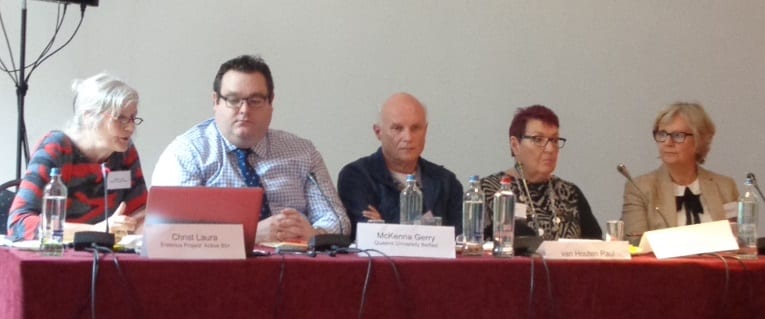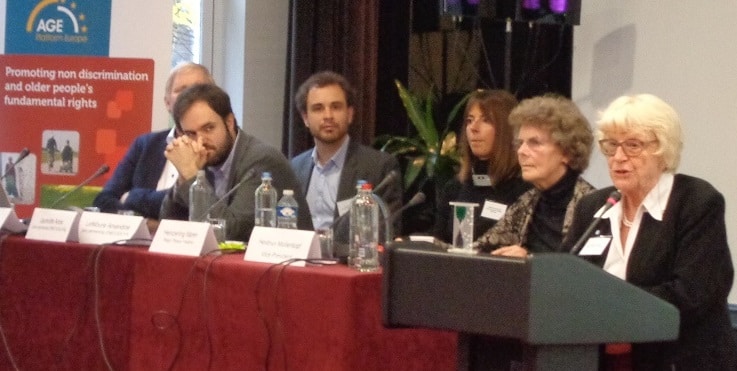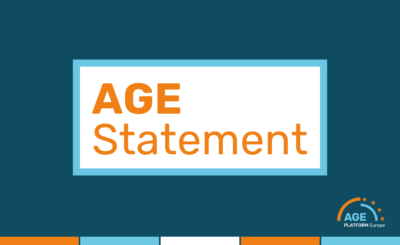
AGE General Assembly
AGE members are increasingly using a human rights narrative in their advocacy at national and European levels. AGE Platform is also actively involved in the international debate on older person’s rights, including the discussion with the United Nations (UN) around a new international convention on the rights of older people.
The General Assembly opened on 16 November with a thematic session dedicated to human rights in old age gathering about hundred representatives of non-governmental organizations (NGOs). The session provided training with an aim to increase the understanding about why human rights matter and how older people and their organisations can use existing human rights mechanisms to drive policy change. A detailed report from AGE thematic session on human rights can be read here.
On 17 November, AGE General Assembly adopted the following two policy documents to guide AGE work for the year to come:
- AGE General Assembly’s Final Declaration: including recommendations to the European Union and national governments to make use of the potential of the Madrid International Plan of Action on Ageing (MIPAA) to strengthen equality, fairness and cohesion in an ageing Europe.
- AGE Human Rights Manifesto: drafted with the direct involvement of more than 100 representative organisations of older people, it outlines AGE members’ vision on human rights in 7 essential principles that should take into account when promoting older people’s rights.
To learn more, please access those two documents here
AGE 4th Annual Conference
On 18 November, following the General Assembly, AGE fourth annual conference gathered decision makers, experts, researches and older self-advocates to discuss how best address age discrimination, while strengthening both economic and social rights of older people in view of empowering them as equal citizens.

Following the opening speech, a series of three panels addressed key topics in relation to the further implementation of the Madrid International Plan of Action on Ageing.
The first panel was dedicated to social and technological innovations and the exchange of experience in that field, in particular on transferability of practices from across the EU to the national context. Yves Dario from the King Baudouin Foundation in Belgium shared experience from two initiatives awarded by an EU contest promoting active and healthy ageing, on the direct involvement of older people in the creation, development and management of projects/initiatives and on the barriers to access technology in old age.
Juliane Jarke from the University of Bremen pledged for a greater involvement of older people in the design and development of digital public services – which is indispensable in order to address the challenges that the growing use of digital technologies raise for older people. She insisted on the principle of co-creation as a tool to empower and involve older citizens – together with decision makers, service providers and designers – to take part in the conception of built, mobile and virtual infrastructure.
The second panel on promoting longer working life and ability to work sought to address the current contradiction between the expectation for people to work longer and the persistent age 
- the success of an integrated policy framework involving the different relevant actors (in the social, employment, health, education and equal treatment fields) and not only experts in occupational safety and health;
- the need to combine measures to increase working lives (e.g. increase in pension age) with measures to improve the employability and health of older people;
- the importance of a life-course and diversity approach in corporate age management policy; and
- the positive impact of simple return-to-work strategies to support longer working lives.
Another aspect put forward in debate was the role of working time reduction and of partial retirement schemes to enable people to work longer in meeting older workers’ needs. It is one of the findings coming out of the recent study on ‘Work preferences after 50 and flexible retirement schemes’ carried out by the European Foundation for the Improvement of Living and Working Conditions (Eurofound). ‘Older people should be enabled but also motivated to work longer’, pointed out Hans Dubois from Eurofound.
Feedback for national and regional practice was furthermore provided by Anne Himpens, representing the Flemish Regional Department for Work and Social Economy, with the example of a programme implemented in Belgium and Flanders and aiming to support health management and skill upgrading in the work place, namely through financial incentives and exchange of experience.

The issue of one’s well-being and dignity in old age was also highlighted in relation to dental care and incontinence, in particular the poor understanding of both phenomena and challenges they raise for national health care systems in terms of individual needs and costs. Gerry McKenna from Queens University in Belfast Dental insisted on how dental problems may compromise individual health and well-being, whilst the lack of adequate care is the cause of other health issues in old age.
The highlight of the conference was the testimony of Edwina White who as a self-advocate shared her experience about the challenges incontinence problems raise for you to live an active independent and dignified life at home and in the community. Considering the invisibility and poor understanding of these challenges, Ms White called for further awareness raising not only among policy makers, health or care professionals, but also among persons with similar problems. To complete this personal testimony, Paul van Houten, expert in continence care from Zonnehuisgroep Amstelland, shared key findings from the research on incontinence problems versus independent and dignified life. To address challenges successfully, Mr van Houten called on to adapt existing infrastructures and to change people’s and decision makers’ attitude.

In her conclusions, Ms Boulanger announced EU specific actions to combat violence against women including in old age, as well as the planned directive of unfair commercial practices to protect the rights of vulnerable consumers.
In the afternoon, a session with policy makers was dedicated to the current mid-term review of the MIPAA, in particular the synergies between policy making at national and EU levels. The session included a presentation on implications for the national policies on active ageing by Olga Pietruchova representing the Ministry of Labour, Social Affairs and the Family of the Slovak Republic. Ms Pietruchova also presented findings from the initiatives undertaken by the Slovak Government in the fields of technological innovations on ageing and longer working life.
This was followed by an update on the current MIPAA mid-term review. Vitalija Gaucaite from the United Nations Economic Commission for Europe (UNECE) committed in particular to strengthening the involvement of older people and their organisations in the follow-up to the implementation of the Madrid Plan. The MIPAA, reminded Mr Gaucaite, is ‘a comprehensive plan making all relevant ministries and people work together’. Participants also applauded the UNECE engagement to pursue and fully seize MIPAA’s potential to trigger policy change and ultimately to improve the situation of older people at the grass roots level.

- ‘Magic Physics’, an initiative in which older volunteers bring assistance to children, including migrant children in elementary schools;
- Enéo-SOLIVAL partnership for independent living at home in old age, offering a free service to help older people adapt their homes to their ageing needs;
- Dementia-friendly programme of the city of Bruges (Belgium), proposing a comprehensive approach to the needs of people with dementia in various aspects of community and local life; and
- iCareCoops, a project on care cooperatives of older people, promoting greater solidarity within and across generations.
Conclusions
AGE’s three-day event provided, this year again, an opportunity for dynamic and rich exchange among actors from different areas and across local, regional, national, European and global levels to reflect together on solutions to manage our common demographic challenge. The diversity of the topics discussed and of the number of initiatives presented highlighted the complexity and multi-dimensional aspect of ageing and rights related issues, but also the dynamism, and the strong engagement and cooperation it generates.
Existing practices, partnerships and exchanges of experience across the EU are essential not only to increase understanding on older people’s needs; they also combine forces to address one of the major societal challenges, ageing population, and make it an opportunity for further social and economic development, without increasing inequalities and discrimination. AGE General Assembly and 4th Annual Conference proved that common efforts can bring tangible changes in individual lives of older people.






